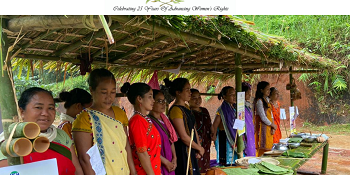Food acts as a platform for every action we take for the future. It defines our identity, culture, the landscape for what we are. Through research and studies, the Food and Agricultural has declared that 14% of food production is lost each year between the stages that it grows till it reaches the market. 2 billion people have limited and irregular access to safe nutritious and sufficient food. 690 million people go hungry and the pandemic could add an additional 83-132 million.
World Food Day is celebrated every year on October 16 across 150 countries to tackle global hunger and strive to eradicate hunger globally. This years’ theme: Grow, Nourish, Sustain Together. Our actions are our future promotes global awareness and action for those who are affected by hunger and calling for the need to ensure healthy diets for all.
Taking part in this global celebration, North East Network organized a ‘Nutritional Indigenous Food Display’ that highlighted indigenous cuisines that are both delicious and nutritious. These delicacies were made from locally grown vegetables and wild edibles, some even included silkworm- a delicacy popular among the Bhoi culture. Phidarilin Uriah, a programme associate of NEN stated ‘Our forefathers have left us with clean water, forests filled with food and fertile soil’, they ensured that the environment that has been their provider for eons and that they should be protected. ‘What is it that we are leaving for our generations to come? Have we exhausted everything or are we keeping some for them too’? She reiterated that a time will come that the future generations will not know the origin of food especially our indigenous food, so it is important that we mend our present actions.
Kong Thran Tmung, a weaver and farmer by profession is a strong advocate of conservation of culture and is famous for her 32 ingredient recipes. She is a knowledge holder on weaving and traditional agricultural techniques and has represented the State on different platforms nationally. In her speech, she recalled the memories of relishing varieties of fruits available in the forest but now with rapid deforestation, these wild fruits are pushed towards extinction. Our food represents our unique culture but we are witnessing a move towards the culture of fast foods especially among our children. It is, therefore, our duty to preserve and share what is given to us abundantly so that the generations to come will benefit from it as well.
The programme witnessed a melodious performance by the villagers in their own Mikir dialect and a food display by 6 participating groups. The exhibition also required the groups to elucidate on the medicinal properties of each ingredient used and its importance for building our health system.

























